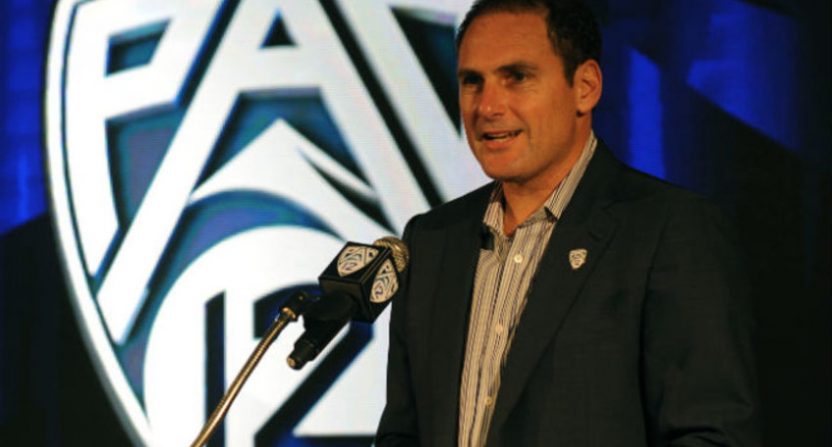The Pac-12’s much–discussed private equity plan didn’t come to fruition, but it seems the conference now may wind up doing business with investment bank The Raine Group (which they initially hired to explore that project) on a different level. As per Jon Wilner of the (San Jose-based) Mercury News, the conference is now exploring a conference-wide loan that could be accessed by individual athletic departments (at a maximum of $83 million per school, and at an interest rate of 3.75 percent over 10 years, although those terms are not yet finalized). That might be particularly important if the Pac-12’s fall football plans don’t go as imagined. Here’s more from Wilner’s piece:
The Pac-12 is planning a mammoth loan program that would provide an escape hatch for cash-strapped athletic departments in the event the football season is canceled because of coronavirus, according to internal documents and conference sources.
…“The conference is trying to be nimble and give schools some options,’’ a source said.
…“All loan capacity is being used for things besides athletics,’’ a source said. “They’re trying to get the core (academic) programs through for the next three years without firing people.
And that absolutely speaks to why the conference would explore this. Universities are under an incredible amount of pressure at the moment, whether that’s about protocols to conduct in-person classes amidst the COVID-19 pandemic or about shifts to remote learning amidst that. And long-term athletics TV contracts (in the case of the Pac-12, with ESPN and Fox through 2023-24) are good collateral, and collateral outside the scope of normal university operations.
The latest
And the conference revenues here are not terribly uncertain. Unlike the initial equity proposal, which was about future media rights deals, these terms are only about the existing deals with Fox and ESPN. Yes, there could be some adjustments to those deals based on what happens with college sports this year and next, but if banks are willing to offer credit to Pac-12 schools based on those deals at a rate of 3.75 percent over 10 years (which doesn’t seem that bad, all things considered, and might be better than some of these schools can do on their own), there seems to be some logic for schools facing immediate athletic budget problems due to the pandemic to take some or all of that offered credit.
And for many schools, that may not be up to the $83 million per-school max. They may just take what they immediately need, and pay only the according amount of interest. And there’s also perhaps some logic here for Pac-12 schools. The cited reason for exploring the equity idea in the first place was the need for an immediate cash infusion to compete with schools from the Big Ten and SEC with more lucrative current media deals. That cash may be even more necessary in this current time of crisis.
There are some reasons for skepticism with this featuring Raine, though, after that abortive private equity proposal. Wilner quotes an email from Oregon president Michael Schill (who became chair of the conference’s CEO group on July 1), as saying “I did know that [Pac-12 comissioner] Larry [Scott, seen above] was going to investigate putting together a loan. I guess he went with Raine. I hope the terms reflect work and not a finder’s fee that is outside the norm.”
And that private equity proposal really did not go well; the conference’s initially-discussed terms were laughed at by many observers, and Wilner’s piece says that that USC and UCLA were not willing to offer a 25- or 30-year grant of rights to the conference, which meant that the whole equity idea was pretty much dead on arrival. So Raine’s involvement here certainly deserves a critical eye, and before any of these schools take this loan, it’s definitely worth making sure that these are better terms than they could have received elsewhere.
But the general idea of offering a loan to conference schools based on the next few years of already-locked up conference TV deals isn’t a bad one. There’s better negotiating power with a group (which is why college athletic conferences exist in the first place), and it may make sense for athletic departments to explore their own loans (against already-promised revenues) while their parent institutions are facing their own crises. And this particular approach may prove valuable for some Pac-12 schools. But there are many questions left still, including about the terms Raine is offering here and if the conference could have done better elsewhere. We’ll see where this goes.







